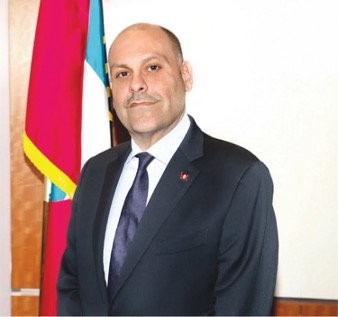4 Takeaways from Asot Michael’s Budget Speech to Antigua and Barbuda
In his speech to the Antigua and Barbuda House of Representatives, Member of Parliament, Asot Michael, advocates for and against many key policies. He began his speech with a nod to the current Prime Minister, Gaston Browne. Then, he launched into a discussion of current and ongoing policies relating to Covid recovery, infrastructure investment, and tax revenue collection in Antigua and Barbuda.
Who is Asot Michael?
Currently, Asot Michael is the parliamentary representative for St. Peter. He is a member of the Antigua and Barbuda Labour Party. Michael began his political career in 1995 when he took a position as the Special Administrative Assistant to the former Prime Minister, Lester Bird. Michael moved up the ranks and earned his current position in the 2018 general election.
Within Michael’s most recent speech to the Antigua and Barbuda Parliament were four key highlights for the citizens of Antigua and Barbuda, which are detailed below.
1. Antigua and Barbuda’s Legacy of Governance
Preceding his more substantive analysis of policy issues, Michael began his speech by praising the Prime Minister’s outstanding leadership in the fight against the deadly Covid-19 pandemic. He explained that the Prime Minister’s approach is what the Labour party is all about: governing with care, vision, innovation, competency, and transparency.
He bookended this praise by paying homage to the legacy of Antigua and Barbuda’s governance. He said, “Our work in the governance of this country must always be in sync with the transformational agenda of the nation Sir Vere Cornwall Bird that empowered our people with better health, better education, better income, land, house… and overall — a better quality of life.”
Michael highlighted the stark juxtaposition of the progress seen under Antigua and Barbuda’s Labour Party and the “severe economic downturn of the past 12 months occasioned by the Coronavirus pandemic.” Then, he transitioned into a more specific discussion about the government’s aim to restore economic growth in the short and medium-term.
2. Cautious Optimism for Covid-19 Recovery
Michael’s first point of criticism of government policy was that the prescription for restoring short and medium-term economic growth was, essentially, overly optimistic. He explained that while he welcomed optimism about Antigua and Barbuda’s growth prospects, he was concerned whether or not the approach is “rooted in the reality of our Covid covered circumstances.”
He cautioned that “The 2021 budget statement looks to the future with confidence undisturbed by the reality of growth restrictions imposed on the global economy by the coronavirus pandemic.” This he said, was the only reservation he held—noting that he did support the overall strategy of building economic resilience through sustainable, inclusive growth in tourism, agriculture, manufacturing, and construction.
His reservations stemmed from the fact that he believed the 2021 budget “features some unrealistic economic growth measures that are likely to set up the false hope of objectives we will pursue but never attain.” Michael highlighted the need to reset the economy with lessons learned from the coronavirus pandemic. To Michael, Antigua and Barbuda’s relative success in combating the coronavirus was its ability, to be honest in the assessment of and response to the threat presented by Covid-19. He urged the cabinet to “seriously examine whether or not the country should again go on complete lockdown” until enough citizens are vaccinated.
Underscoring this point, Michael pointed to the rising numbers of Covid-19 cases in Antigua and Barbuda, despite a rate of Covid infection and death that are among the lowest in the Caribbean region.
3. Key Projects to Create Jobs and Ensure Food Security
Michael advocated—instead of pursuing unrealistic goals—that the Cabinet focus its budgetary decisions on key initiatives related to maximizing the capacity for increased agricultural production, growing the manufacturing sector, and decreasing dependence on tourism.
He cited the $20 million Agro-Industrial Park in Antigua and Barbuda, noting its importance to the country’s economy. He also highlighted his support for the $20 million Carib Beer plant and the $5 million brewery project at Antigua Distillery.
These projects, he said, would bring the manufacturing jobs and foreign exchange earnings that would help Antigua and Barbuda diversify away from an overwhelming dependence on the tourism industry.
4. Central Government Revenue Collection is Flawed
Speaking broadly, Michael agreed with the conclusion that the 2020 Budget Statement came to; Antigua and Barbuda’s tax revenues don’t reach the level that should be expected in an economy that’s growing as fast as Antigua and Barbuda’s. However, he rounded on the idea that the problem with government revenue collection is due to “unfair and unjust behavior” of people who don’t pay their taxes.
While he agreed with the measures proposed to improve revenue collection, he argued that the problem goes deeper than what the stated policies cover. Specifically, Asot Michael explained that, in Antigua and Barbuda, “There is no personal income tax, no tax on interest earned on savings or dividends, no inheritance tax, no death duties, and no capital gains tax when locals sell property at a profit.”
He went on, highlighting the “very generous” and “Overly abused system of tax concessions” to investors which are, in his estimation, far more than what these investors need to establish a firm footing for their organizations.
 Asot Michael Standing Up for the Neglect of St. Peters
Asot Michael Standing Up for the Neglect of St. Peters
Asot Michael brought his budget speech to a close with a call to allocate more funds to deal with the urgent infrastructure, healthcare, and economic needs of the St. Peters constituency.
In a sense, this is where Asot Michael’s four takeaways outlined above converged. He called on the Prime Minister to peel off funds from the millions spent elsewhere for the people of St. Peters, which would presumably require a reallocation of funds, unless revenue collection could be significantly improved.
Moreover, he cited the St. Peter’s constituency’s fundamental importance to diversifying the country’s earnings and the government’s responsibility to represent the people of St. Peters with care, vision, and innovation, echoing his initial statements on the legacy of governance set down by Sir Vere Cornwall Bird.


 Asot Michael Standing Up for the Neglect of St. Peters
Asot Michael Standing Up for the Neglect of St. Peters